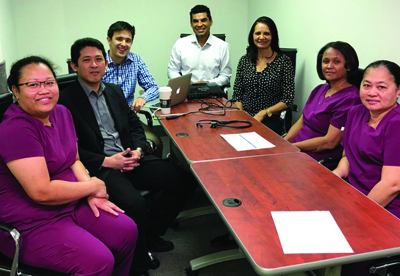Fall 2018 (Volume 28, Number 3)
My Journey to Happiness as a Rheumatologist in Saskatoon
By Regan Arendse, MD, FRCPC
Download PDF
My decision to work as a rheumatologist in Saskatoon, seven years ago, is one of the best I have ever made. The people of Saskatchewan are warm, welcoming and sincere. My colleagues in the Division of Rheumatology and associated departments are supportive, accommodating and helpful. Being happy at work is perhaps one of the greatest blessings to have.
One of the main factors that contributed to my decision to work in Canada was my inability to find a state-supported position as a newly qualified rheumatologist in South Africa. While there is a huge need for rheumatology services in South Africa, there are extremely few state-funded positions available. At the time I had completed my training in rheumatology, all the available positions had been filled with no prospect of a vacancy opening for at least 5 to 10 years. The prospect of committing to a private practice, which posed the challenge of trying to provide services to patients who were compelled to pay hard-earned currency for expensive medications, was not appealing to me. After much discussion with my family, we made the difficult decision to leave Cape Town, one of the most beautiful cities in the world according to a recent CNN article, to explore employment opportunities internationally.
The Netherlands is an amazing place to work; from space-age offices that reminded me of scenes from the Starship Enterprise, to super-efficient colleagues and paramedical staff and the innovative incorporation of musculoskeletal ultrasound examination into routine clinical care. Most interesting was the pragmatic Dutch approach to problems. The university medical center, Erasmus MC in Rotterdam, where I worked, employed in excess of 13,000 people in 2011. To reduce the major strain placed on parking facilities, they decreed that all employees including the CEO would commute to work either by public transit or by bicycle, thus increasing the availability of parking for their patients. I learned many valuable practical lessons at Erasmus MC on how to assess and manage complex rheumatology patients who were referred for quaternary care.

Dr. Arendse and his team: Rhovely Ross, Dr. Myat Tun-Nyo, Dr. Richard Tse, Dr. Regan Arendse, Dr. Germaine Arendse, Denise Carolus and Grace Castro
While working in the Netherlands, I received a call from a recruitment agency to discuss employment opportunities in Canada. I was notified of rheumatology vacancies in many provinces, extending from St. John’s in Newfoundland all the way across to Victoria in British Columbia. Despite having travelled extensively, my wife Germaine and I had never visited Canada before. With my own work opportunities secured, we focused on finding a city that would provide Germaine the opportunity to enroll in a PhD program in immunology. Thus, it came to be that we both accepted positions at the University of Saskatchewan; I in the Division of Rheumatology and Germaine in the Department of Microbiology and Immunology. Upon completion of my required certification examination with the Royal College of Physicians of Canada (and of Germaine’s PhD thesis) we decided to work in the same office in collaboration. A very satisfying ending to a long journey across the globe to find happiness in employment.
Regan Arendse, MD, FRCPC
Assistant Clinical Professor,
University of Saskatchewan
Saskatoon, Saskatchewan
|
